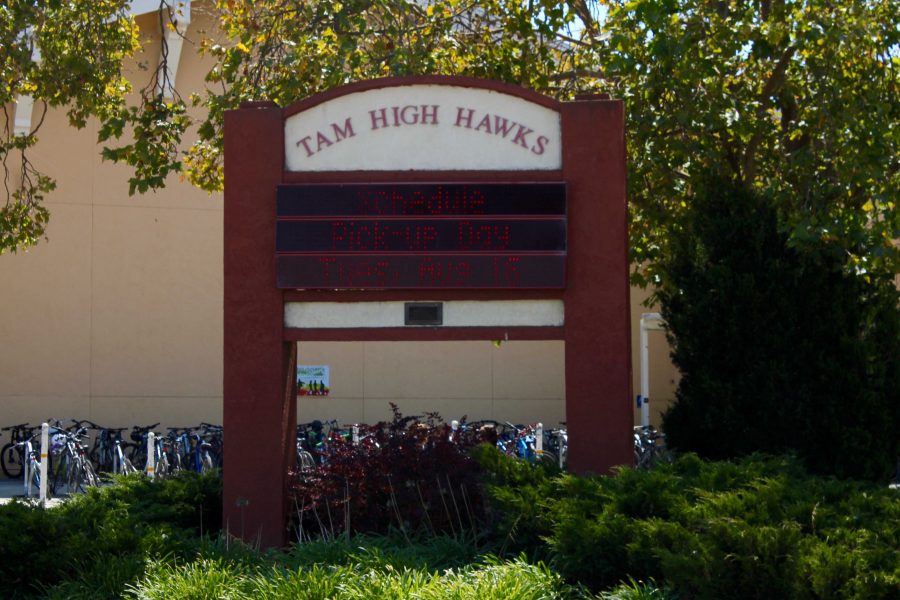On April 20th, Tam High students partook in the national walkout to protest gun violence and to remember the lives lost twenty years ago in the Columbine shooting. Students and guest speakers spoke, including Tam junior Yamaecha Davis and sophomore Ta’ Naejah Reed. They were among the few people of color at the walkout.
In their speech, they asked for twenty seconds of silence to signify the number of times Sacramento police shot Stephon Clark in his grandmother’s backyard. They emphasized that the Black Lives Matter movement and the black community have fought to end gun violence long before the Parkland shooting; the shootings of unarmed black men by police are as much a form of gun violence as mass shootings.
“I feel like it’s a part of me, because I’ve seen things happen with family members,” Davis said of fighting for black lives. Reed snapped her fingers in agreement.
“I have a little brother. My mom is always telling him to ‘protect yourself,’ ‘you can’t do this, you can’t do that, because you are a black man,”’ Reed said. Both cannot bear to imagine something terrible happening to their twelve-year-old brothers, and yet those terrible things happen far too often to black men and boys–– according to Mapping Gun Violence, black men are three times more than white men likely to be killed by police.
Along with fighting for black lives, Reed also wants to fight for mental health because she believes it has a strong connection with gun violence. “Somewhere in society, we weren’t raised right, treated right, and that messes with our heads,” Reed said.
“[Mental health] is probably the key to why everything continues for people of color,” Davis said. “The incarceration system, education system…”
“The slavery system!” Reed chimed in. All of these systems have been designed to diminish black people’s mental health, and it results in depression, anxiety, low self esteem, and anger issues, the two explained.
Both try to engage in activism regularly. Davis is a member of Speaking Out Against Racism (SOAR). “Everyone should know about racism and how it affects everyone,” Davis said. Reed has previously organized events––for example, movie nights–– within her community, Marin City. “I feel like activism could be anything when it comes to black people,” Reed said. She organized the movie night to provide her peers with activities instead of “being outside doing nothing.”
Upon meeting both Davis and Reed, anyone can sense their confidence and poise. Yet it took courage for them to speak at the walkout. “I never really try to speak out [on campus]” Davis said. “I wouldn’t be as supported as other people.” Davis and Reed both feel like the Tam community does not support their voices and opinions because they are black.
They feel the same about the current gun control movement. “[White people] felt more comfortable showing up to the March for Our Lives because its organized by not a lot of people of color,” Davis said. She went to the rally on March 24th, but the experience wasn’t very fulfilling for her. “I totally support them, but they have a huge platform and they’re not saying anything about [Black Lives Matter]… Half of these people wouldn’t come to a Black Lives Matter protest, and its the same thing.” Davis felt that Black Lives Matter has lost its voice to the current movement.
In Marin City, Davis and Reed stand out for their activism. “There are not a lot of colored people at our school that are willing to speak up and take time out of their day to do the protest,” Reed said. “Deep down inside they think, my life matters, but they get distracted [by stereotypes].” For example, “[there is] pressure on guys to be like “that black guy” who does whatever he wants.”
Davis believes more students of color would engage in activism if they were more educated on the causes of issues within their community. . “I know a lot of people of color that don’t know about these issues because they are around a predominantly white community, and then they just see the news,” which continues to exclude issues facing people of color, Davis explains.
Despite the discouragement Davis and Reed experience at Tam, they continue to engage with these issues in other ways. Davis, Reed, and other Marin City youth travelled to Montgomery, Alabama for the opening ceremony of the Lynching Memorial with the organization Performing Stars of Marin City. They listened to prominent African American Activists like Jesse Jackson, Bryan Stevenson, and John Lewis speak. They visited the legacy museum, which focuses on the journey from enslavement to mass incarceration and the toll it takes on families. There, they learned more about their past, while taking a glimpse at a future America that can move past the atrocities it once sanctioned, like lynching.
Davis and Reed both look up to their moms as role models. The pure act of mentioning their mothers seems to stir deep emotion within both of them. At home, they have strong foundations of support and inspiration, but once they step onto the Tam campus, they feel silenced. Coming back from Alabama, Davis and Reed are even more prepared to take action and make a difference in their community.


